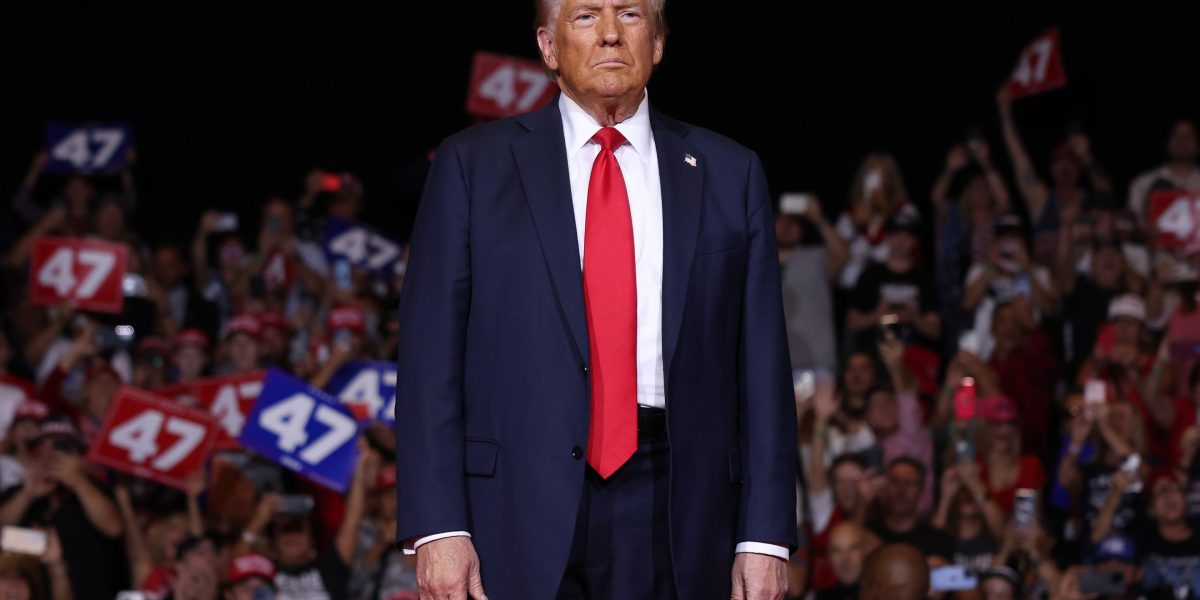In the words of Yogi Berra, “it’s tough to make predictions, especially about the future.” But the Dad-joke favored baseball icon was blissfully unaware of crypto.
Election day looms, in the spirit of spooky season, like a ghoul or ghost around the corner. But while predicting the future can be a fool’s game, Americans are scrambling for any insight regarding what might be one of the closest elections in recent history—and unprecedented times call for unprecedented sources.
For the 2024 presidential election, it might be wise to not just look to the polls, but also check out prediction markets. “The markets tend to be the single best piece of information available out there,” Rutgers professor of statistics, Harry Crane, told Fortune.
Polls are tight, but Democratic nominee and Vice President Kamala Harris is pulling slightly ahead of Republican nominee and former President Donald Trump, according to Morning Consult’s weekly poll, which cites Nate Silver’s FiveThirtyEight data. The prediction markets paint a different picture, though, and perhaps a more accurate one, Crane claims.
Prediction markets website PredictIt currently places Trump ahead of Harris—and elsewhere, on the crypto side of the world, Trump is in the lead as well. Polymarket, a cryptocurrency-based prediction marketplace, currently shows Trump ahead in the presidential election by 57.7% to 41.9%. Harris, though, is projected by the same site to win the popular vote by 61.9% to 37.8%.
“Political betting sites are the best at predicting the wisdom of the crowd,” Thomas Miller, a data scientist at Northwestern University, told Fortune’s Shawn Tully. While they don’t necessarily have a wider scope, these markets can predict the future better than polls as they have an economic incentive, Crane adds. “The poll is asking you who you’re going to vote for… nobody cares who you’re going to vote for. What people care about is who’s going to win,” he said.
Having studied the cash markets of PredicIt’s accuracy previously, Crane says “those markets are actually pretty accurate, at least more accurate than polling aggregators at 538 and so on.” But crypto, surprisingly enough, carries even more weight.
Cash prediction markets beat out polls and crypto prediction markets beat out cash
Crypto might be drying off in terms of public interest, but it’s found a particular niche in the prediction market world. As it stands, slightly more than $1.9 billion in crypto has been traded on the site.
Both markets have a “skewed demographic,” notes Crane, explaining that they’re often male-dominated and many don’t even have Americans in them. And not everyone is an active trader, as people often place small bets at one point and do not return. Even so, they carry more weight than polls, he says. Of course, Trump has more favor with those in the crypto sector, which could possibly be tilting the scales in his favor on said site. But as Crane points out, other non-crypto prediction markets like Betfair and Kalshi are mostly in line with Polymarket.
“If I had to pick one market it would be Polymarket to be the closest to the best single estimate,” said Crane, adding that he tries to take a consensus market price. But just as there is a margin of error in polls, there’s a margin of inefficiency in prediction markets, per Crane,
According to his calculations, Polymarket has the smallest margin of inefficiency at 1.33% compared to 11.08% for PredictIt. PredictIt has a 10% commission on profitable trades and also some regulations like limiting betting to $850 per trader and 5,000 participants in any given market. “The markets with higher liquidity, less lower fee structure, and less regulatory restrictions are the ones that tend to be the most accurate,” Crane said, which leads to Polymarket gaining an edge.
While Polymarket hasn’t been around or studied for as long as PredictIt, Crane says if you forced him to bet on it, he’d say the former is shaping up to be more accurate this cycle. But that “doesn’t mean Trump’s going to win.” Rather, it’s “a good signal, and a more accurate signal than what I would expect from PredictIt,” Crane said.
Just this past month, prediction markets Kalshi and Interactive Brokers have come online legally in the U.S. These markets, which are restricted to U.S. participants, are less restricted in trading than PredictIt, but still slightly more likely to have a greater margin of inefficiency according to Crane’s calculations. In the long-term, though, these markets might edge out Polymarket as it’s easier to use and perhaps less alienating than crypto, explains Crane.
Foul play might be possible in these prediction markets though, as the New York Times’ Dealbook points to large bets in favor of Trump from single users as well as Elon Musk’s comments about prediction markets. Acknowledging said allegations, Crane notes there’s a difference between someone who is buying a lot of shares of something and someone who is intentionally trying to manipulate the market. In the latter case, the market will often correct themselves. He doubts this is necessarily the case though since other prediction markets and polls have warmed up to Trump in various ways.
Who wins is really still “anyone’s guess.” But crypto might be better at adapting to volatility in such a tight race. Either way, Polymarket is shaping up to be a short-term glimpse into the future. “Polls are probably going to continue to be in Trump’s favor, at least for the next week. And the reason I say that is because the markets are tending to be about a week ahead of the polls,” adds Crane.

